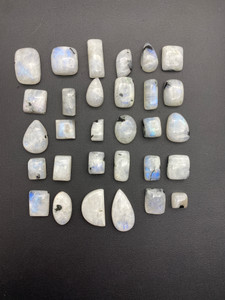
Moonstone & Tourmaline, Cabochons, 25, 50 or 100 Gram Lot Assorted Shapes & Sizes
Beauty in the Bead
Moonstone & Tourmaline, Pendants, Assorted Shapes & Sizes
This image is of a similar assortment of 100 grams of Moonstone & Tourmaline.
50 gram lots will be 50% less pieces.
25 gram lots will be 75% less pieces.
Millimeter sizes mentioned are a suggested range, not a guarantee.
This is Moonstone with natural Black Tourmaline inclusions. Moonstone is in the feldspar group that displays a pearly and opalescent schiller. Schiller is produced because of light interference because the light needs to weave its way through the layers with different optical properties. The best moonstone has a blue sheen, perfect clarity, and a colorless body color.
Moonstone has been used in jewelry for millennia, including ancient civilizations. The Romans admired moonstone, as they believed it was derived from solidified rays of the Moon. Deposits of moonstone occur in Armenia, Australia, Austria, Brazil, Mexico, Madagascar, Myanmar, Norway, Poland, India, Sri Lanka and the United States.
Moonstone is the state gemstone of Florida.
Difference between Moonstone and “Rainbow Moonstone”: Technically “Rainbow Moonstone” is White Labradorite. Labradorite is a calcium sodium feldspar and Moonstone is a potassium sodium feldspar and has a lower refractive index than Labradorite. Blue and white are the only colors for a Moonstone's sheen. White Labradorite, also known as Rainbow Moonstone exhibits rainbows and flashy colors such as yellow, orange, or purple. Rainbow Moonstone has been coined by the lapidary and mineral communities to describe this stone even though it is not a Moonstone, so we will also call it Rainbow Moonstone.
Hardness 6-6.5
This is a natural stone that has had no treatment other than cutting, drilling, and polishing.